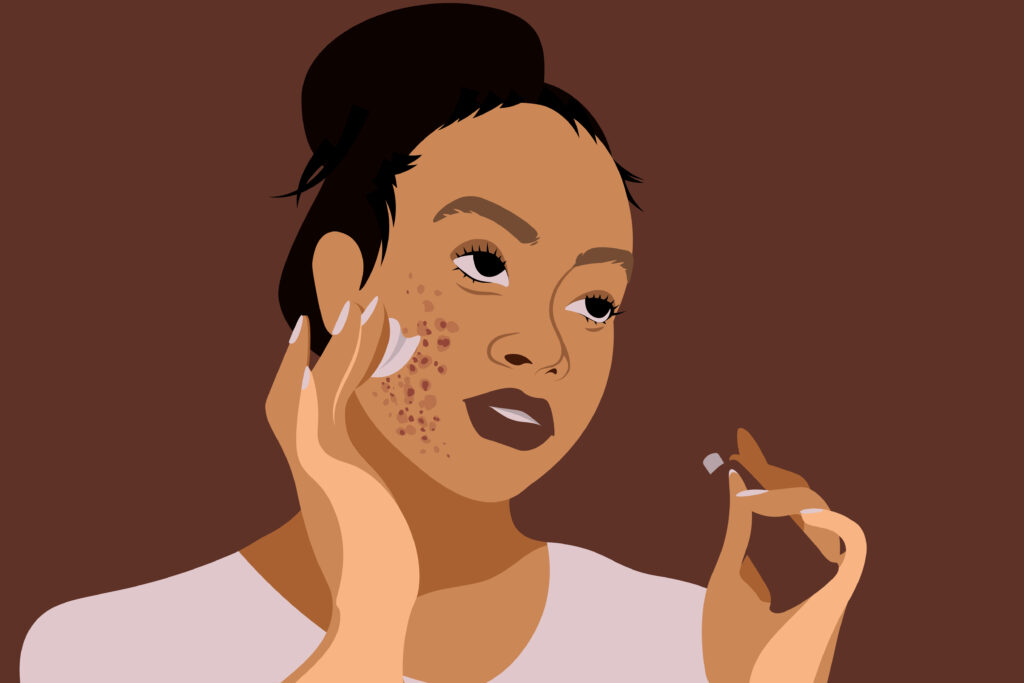
Overview
Acne is a common skin condition that most people experience at some point in their lives. It is not life-threatening but can be painful, especially when it is a severe case. Additionally, it can cause emotional distress and impact a person’s self-esteem to those experiencing it.
Acne causes spots, oily skin and sometimes skin that’s hot or painful to touch. However, there are effective treatments that reduce the number of spots you get and the chances of any permanent physical damage to the affected area.
Key facts
- Acne is a skin condition that involves the oil glands at the base of hair follicles
- It affects 3 in every 4 people aged 11 to 30 years
- It is not dangerous, but it can leave skin scars
- Treatment options vary depending on the severity and persistence of it.
Symptoms
Acne can occur almost anywhere on the body, though it is most commonly found on the face, back, neck, chest and shoulders.
If you have acne, you’ll notice spots (also known as pimples) which primarily are either black or white in appearance – called blackheads and whiteheads accordingly. Blackheads open on the surface of the skin and appear black because of exposure to oxygen in the air. Whereas whiteheads appear just under the skin and therefore, have a white appearance.
Whiteheads and blackheads are the most common spots (sometimes medically called lesions) but other Inflammatory lesions can cause scarring of your skin. Such spots include:
- Papules, which are small, red, raised bumps caused by inflamed or infected hair follicles
- Pustules are small red pimples that have pus at their tips
- Nodules which are solid, often painful lumps beneath the surface of your skin
- Cysts are large lumps found beneath your skin that contain pus and are usually painful
Diagnosis
To diagnose acne, your doctor will examine your skin and any spots that you have. They will also be able to identify the types of lesions you have and their severity to decide the best course of treatment.
Causes
Acne happens when the tiny holes in your skin (called pores) become blocked with oil, bacteria, dead skin cells, and dirt. This then causes a pimple or spot. If you experience an outbreak of spots in a concentrated area or on a regular basis, it is likely that you have acne.
There are key factors that drive acne to develop. These include:
- Hormonal changes caused by puberty or pregnancy
- Some medications, such as certain birth control pills or corticosteroids
- Having a diet high in refined sugars or carbohydrates
Prevention
For most people, acne is part of hormonal changes that can’t be stopped and so prevention is fairly limited. The key thing is to keep your skin clean to ensure there’s no excess oil and dirt.
Typical Treatments
There are some simple steps you can take at home that can assist in clearing up any acne. These steps include
- Cleaning your skin daily with mild soap to remove excess oil and dirt
- Shampooing your hair regularly and keeping it out of your face
- Using makeup that is water-based
- Try to not squeeze or pick any pimples as this can spread bacteria and any excess oil
- Not wearing a hat or tight headband
- Trying not to touch your face or any affected area
Medication
If the steps above do not help clear your acne, there are a few over-the-counter medications that can help. These contain ingredients that can help kill bacteria or reduce the oil on your skin. These can include:
- Benzoyl peroxide, which is present in many acne creams and gels. It dries out existing pimples and prevents new ones from forming
- Sulphur is a natural ingredient with a distinctive smell that is found in some lotions, cleansers, and masks
- Resorcinol is a less common ingredient that removes dead skin cells
- Salicylic acid is found in soaps and acne washes and helps prevent pores from becoming blocked
If you continue to experience symptoms. Your doctor can prescribe other medications that can help reduce symptoms and prevent scarring. These include:
- Oral or topical antibiotics that reduce inflammation and kill the bacteria that causes spots
- Prescription topical creams work to reduce oil production
If you experience severe acne, your doctor may recommend one of the following procedures to treat it by removing any damaged skin or reducing oil production:
- Photodynamic therapy uses medication and a special light or laser to reduce oil production and bacteria on the skin. Other lasers can be used to help improve acne or scarring
- Dermabrasion removes the top layers of your skin with a rotating brush and works best in treating acne scarring. Sometimes, microdermabrasion is recommended as a way remove dead skin cells
- Cortisone injections if your acne primarily consists of large cysts. Cortisone is a steroid that your body naturally produces. These injections can reduce inflammation and speed healing
Conclusion
Acne is very common and clears up normally within six to eight weeks. However, flare-ups can occur regularly and treatment maybe required for longer-term occurrences.
MOST COMMON






